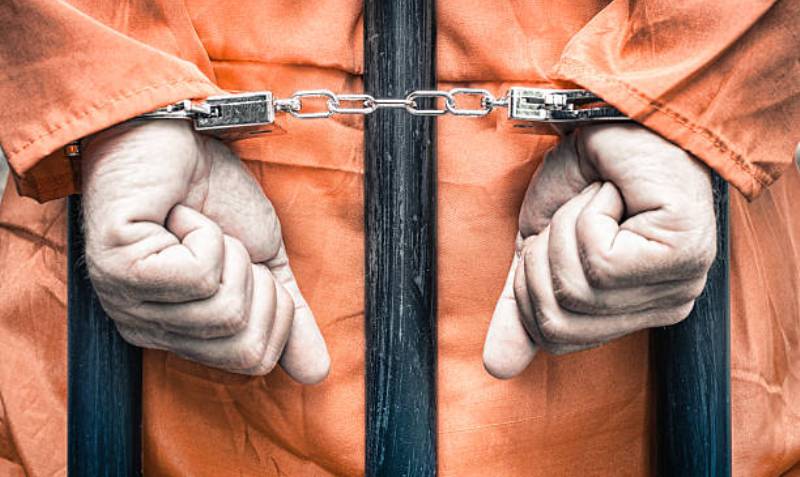
Think about the following questions.
1. Is the death penalty still used in your country? If not, when was it stopped?
2. What are the main arguments for the death penalty?
3. How were people usually put to death in the past?
VOCABULARY PREVIEW
Match each New Academic Word List(NAWL) word with the correct definition.
- injection
- pragmatic _____
- politically _____
- execution _____
- rehabilitation _____
- philosophical _____
- a. relating to matters of fact in a practical way as opposed to depending on ideas or theories
- b. with regard to politics or government
- c. the process of teaching a criminal in prison to live a normal and productive life
- d. of, relating to, or based on beliefs or ideas about truth, knowledge, right and wrong, etc.
- e. the act of forcing a liquid drug into someone using a needle
- f. the act of killing someone, especially as punishment for a crime
THE DEATH PENALTY IN THE US

In the US, the death penalty is sometimes given to people who are found guilty of committing very serious crimes. These crimes could include first-degree1 murder and treason, or betraying2 one's country. Capital punishment was brought to America by early settlers from Europe. In early America, people who were found guilty of murder and rape were routinely3 executed, either by hanging or by a firing squad. Convicted burglars, thieves, and even counterfeiters4 often received the death penalty. This was thought to be a deterrents5 to other criminals.
Over time, people began to feel that criminals were not evil. Instead, they were victims of poverty, poor education, and lack of opportunity. Society should focus on rehabilitation rather than punishment, they thought. Another reason for the change in thinking was economic. Prisons were very expensive. Early American states could not afford to keep many criminals behind bars. Rather than keep them in prison, they executed convicted criminals. But as society became richer during the Industrial Revolution, prisons became more affordable to maintain. For this and other reasons, keeping criminals in prison rather than executing them became a viable6 option.
By the mid-1800s, many states had banned the death penalty except in the case of convicted murderers. Those states were mostly in the northeastern part of the country, while the southern and western states kept the death penalty for many crimes. Even today, most executions happen in the southern and western states. These states are, in general, more politically conservative7 than northeastern ones, and conservatives are more likely to support capital punishment. In states with capital punishment, death by injection is the standard form of execution. It is considered the most humane way to carry out the sentence.
In the last few years in America, the debate over the death penalty has grown more intense. A powerful argument against the death penalty is that some of the people who are found guilty and sentenced to die are not actually guilty. New methods of verifying8 evidence, such as DNA testing, have helped free many death-row9 inmates. Because, in many cases, criminals cannot be proven one hundred percent guilty, it is not right to sentence them to death, opponents say. There is a chance that they may be innocent. The government of Illinois, one of the biggest states by population, abolished10 capital punishment in 2011 largely for this reason. Then in 2021, Virginia became the nation's first southern state to abolish the death penalty. The governor described this action as "the moral thing to do."
Another argument against the death penalty is pragmatic rather than philosophical - the high cost of executing a prisoner. Nowadays, anyone sentenced to die has the right to appeal11 the sentence several times. The state has to defend its case each time before a higher court. One study found that it costs the state more than $1 million in legal expenses for a prisoner to use up all appeals against the death penalty.
The US remains in heated debate over capital punishment, but there is evidence that public opinion is turning against it. In 2019, for the first time, a majority of Americans (fifty-six percent) said they preferred life in prison over death as punishment for murder. If current trends continue, more states may be following Virginia's lead. The death penalty could soon be a thing of the past.
New Academic Word List
- first-degree 1 : adj. of the most serious type; deserving the harshest punishment
- betray 2 : v. to give information about (a person, country, etc.) to an enemy
- routinely 3 : adv. often; commonly
- counterfeiter 4 : n. someone who illegally produces fake money in order to trick people
- deterrent 5 : n. something that makes someone decide not to do something
- viable 6 : adj. capable of being done or used; workable
- conservative 7 : adj. believing in the value of traditional politics and society
- verify 8 : v. to confirm that something is true or correct
- death row 9 : n. the place where prisoners who have been sentenced to death are kept
- abolish 10 : v. to ban
- appeal 11 : v. to make a formal request for a higher court to review and change a decision
READING COMPREHENSION
A ‣ Mark each statement as true (T) or false (F) according to the reading.
- The death penalty is still used in the US today.
- True
- False
- In the past, people could receive the death penalty for stealing.
- True
- False
- As the US became wealthier, the use of the death penalty increased.
- True
- False
- Politically conservative Americans tend to be more in favor of the death penalty.
- True
- False
- One US poll showed that most people favor life in prison as the punishment for murder.
- True
- False
B ‣ Choose the best answer according to the reading.
- Which is mentioned as a reason for the use of the death penalty in early American history?
- a. Executions were a kind of entertainment.
- b. People at that time were very religious.
- c. It might stop others from committing crimes.
- d. Prisons were a cheaper punishment option.
- In paragraph 2, the word them refers to _____.
- a. states
- b. criminals
- c. prisons
- d. reasons
- In general, which states have stopped using the death penalty?
- a. Eastern states
- b. Northeastern states
- c. Southern states
- d. Western states
- What can be inferred from paragraph 4?
- a. More innocent people have been accused of serious crimes in recent years.
- b. The US federal government is pressuring states to stop the death penalty.
- c. Criminals must now be proven one hundred percent guilty to be sent to prison.
- d. Even conservative voters are beginning to turn against the death penalty.
C ‣ Find the correct numbers in the reading and write them on the lines.
- _____: the year in which Illinois banned the death penalty
- _____: the legal costs of the appeals in a death penalty case
- _____: the percentage of Americans who favor life in prison as the punishment for murder
SUMMARY
Fill in the blanks with the phrases in the box.
- turning against
- proven innocent
- in rehabilitation
- northeastern states
- for many crimes
- couldn't afford
|
Early US History
|
| ↓ |
|
Up to Mid-1800s
|
| ↓ |
|
Today
|
VOCABULARY PRACTICE
Fill in the blanks with the words in the box. Change the form if necessary.
- execution
- philosophical
- politically
- injection
- pragmatic
- rehabilitation
- The country is very _____ divided at the moment. There's no agreement on how to deal with the current crisis.
- After ten years in prison, officials decided that the prisoner's _____ was complete, and he was released.
- Even many supporters of the death penalty are against the _____ of the young man, whom they believe to be innocent.
- This medicine can be taken either in pill form or by _____.
- The company president is _____ in her management style; she simply does whatever works.
- When trying to explain a difficult _____ idea, it's often useful to give a specific example.
SUPPLEMENTAL READING
The Mentally Challenged and the Death Penalty

Mentally challenged people have IQs of below seventy. Many mentally challenged people with IQs of fifty-five and above hold jobs, have children, and do many things that people with normal IQs do. They also commit murder and other crimes. When mentally challenged people commit crimes and are convicted, is it fair to put them to death, as other criminals are sentenced to death? This is a question that the American people and their courts have struggled with for many years. However, in recent years, it seems that the majority of Americans have come closer to agreement on the issue. Most people now think that putting mentally challenged people to death is "cruel and unusual punishment," which is forbidden by the US Constitution.
Daryl Atkins had an IQ of fifty-nine. In the late 1990s, Atkins was found guilty of murder and was given the death penalty in Virginia. His case was appealed all the way up to the US Supreme Court. In 2002, the court ruled that Atkins and other mentally challenged persons may not receive the death penalty. This decision opposed a 1989 Supreme Court decision that said mentally challenged persons could be executed. Since 1976, approximately thirty-five mentally challenged people had been executed in the US.
In the 2002 decision, the court said that the nation had come to a consensus against executing the mentally challenged. They said it is unfair to execute someone who cannot fully understand how bad their actions were.
Fill in the blanks with information from the reading.
- The _____ bans "cruel and unusual" punishment.
- Daryl Atkins's IQ score was _____.
- The Supreme Court decision in 2002 said that _____ people must not be executed.

Leave a comment
Load more